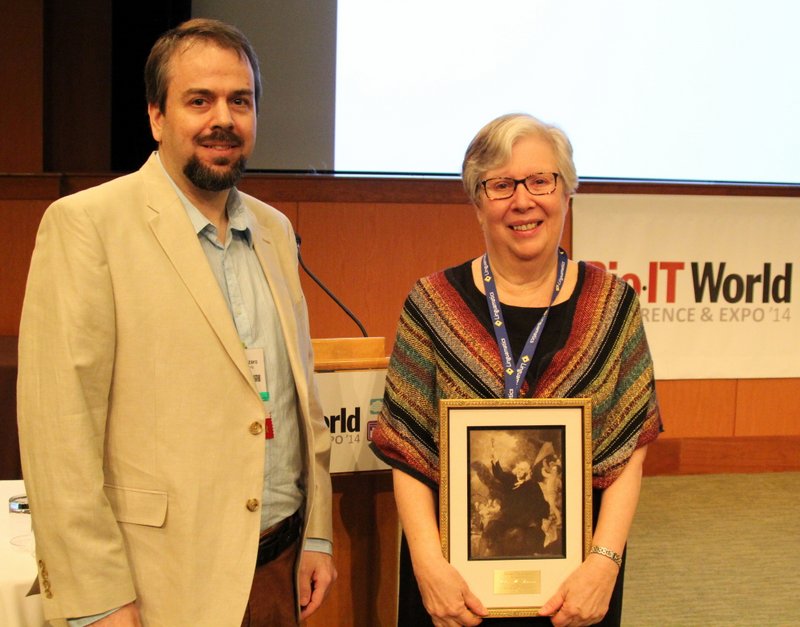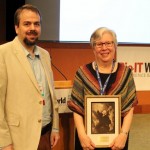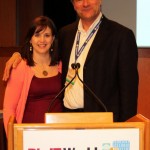By David Li, bostonese.com
Boston, May 1, 2014, — The Bio-IT World Conference handed out the pretigious Ben Franklin Award to Prof. Helen Berman yesterday morning in a plenary session. The winners of the tenth annual Best Practices Awards competition were also announced in the same session at Seaport World Trade Center in South Boston.

J.W. Bizzaro, president of Bioinformatics Orgnization, congratulates Ms. Berman (photo by David Li).
Ms. Berman delivered a keynote speech titled “PDB as a public resource for enabling science” in the plenary session. She acknoleged the pioneers which included J.D. Bernal, Dorothy Crowfoot Hodgkin, John Kendrew and Max Perutz. The Protein Data Bank (PDB) plays a key role in science and biomedical research. Ms. Berman pointed out that the PDB community included structural biologists, chemists, computational biologists, biophysicists, biochemists, geneticists, cell biologists, molecular biologists, educators, students, general public.
According to Ms. Berman, PDB archive was established in 1971, and deposition guidelines was established in 1989. Data standards have been created and updated since 1993, and wwPDB was established in 2003. In 2008, the requirement of experimental data was introduced and validation standards were created so that “the science that is being archived must be important enough for people to want to access
results.”
PDB has enabled safe storage of biomacromolecular data, molecular replacement models for structure determination, “Parts list” for modeling, structure‐based drug design, structure classification and structure prediction. Ms. Berman stressed that the technology for data archiving must updated as IT changed. Ms. Berman ended her talk by quoting Elinor Ostrom, 2009 Noble Prize winner in Economics, “Bottom‐up collective action can work better than top‐down enforcement.”
During a short interview after the plenary session, Ms. Berman mentioned that she was grateful for receiving the Ben Franklin award. “I want to acknowledge people who have been working on this project for over 40 years, and people around the world who made wwPDB possible.”
According to wikipedia, Helen Berman is the director of the RCSB Protein Data Bank – one of the member organizations of the Worldwide Protein Data Bank and a Board of Governors Professor of Chemistry and Chemical Biology at Rutgers University. A structural biologist, her work includes structural analysis of protein-nucleic acid complexes, and the role of water in molecular interactions. She is also the founder and director of the Nucleic Acid Database, and leads the Protein Structure Initiative Structural Genomics Knowledgebase.
The Best Practices Award winners of the five categories include Clinical & Health IT: AstraZeneca and Tessella’s Real Time Analytics for Clinical Trials (REACT) project, TT Infrastructure & HPC: Baylor College of Medicine’s CHARGE: Large-Scale Genomic Analysis in the Cloud project, Research & Drug Discovery: U-BIOPRED’s tranSMART-Based U-BIOPRED Study, Informatics: The Pistoia Alliance, Hierarchical Editing Language for Macromolecules (HELM), and Knowledge Management: Genetech’s Cell Line Resource project. There are also two special awards. Editors’ Prize went to the Icahn School of Medicine at Mt. Sinai for their Rethinking Type 2 Diabetes Through Topological Analysis project, and Judges’ Prize went to United Kingdom National Health Service’s Riak Deployment for Spine2 Distributed Database project.
The Spine database connects patient and services information across 27,000 British organizations that provide National Health Service care.
Prof. Yi-ke Guo, director of Data Science Institute at Imperial College, thanked the team of ubiopred and ETRIKS team, both funded by European union “innovative medicine initiative (IMI) and the transmart foundation, for their hard work in building the ubiopred knowledge management system for translation research in respiratory disease.


